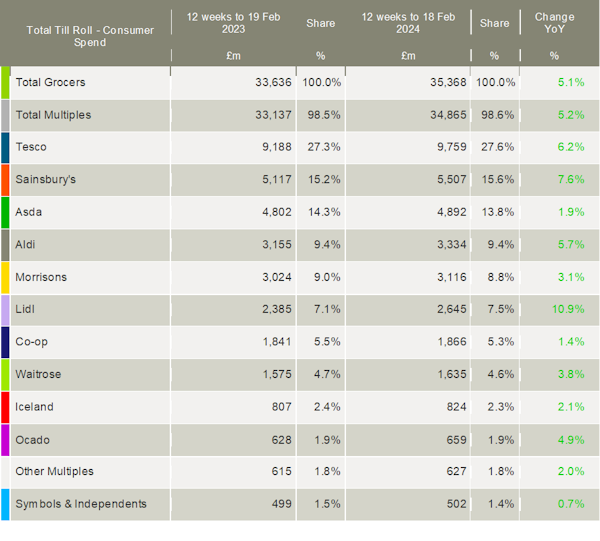Latest data from Kantar shows that grocery price inflation fell to 5.3% this month, marking the lowest rate since March 2022 and a decrease of 1.5 percentage points from January. Take-home grocery sales grew in value by 5.1% during the four weeks to 18 February, with Lidl remaining the fastest-growing grocer in the UK, whilst Tesco and Sainsbury’s picked up market share from their underperforming rivals.
Tom Steel, strategic insight director at Kantar, noted that things are looking up for shoppers after having to navigate a grocery inflation rate of more than 4% for two years. “Though there’s been lots of discussion about the impact the Red Sea shipping crisis might have on the cost of goods, supermarkets have been pulling out all the stops to keep prices down and help people manage their budgets,” he said.
“This month, Morrisons became the latest retailer to launch a price match scheme with Aldi and Lidl, after Asda made the move in January. More generally, we saw promotions accelerate this month after a post-Christmas slowdown. Consumers’ spending on offers increased by 4% in February, worth £586m more than the same month in 2023. Sainsbury’s and Iceland’s efforts paid off in particular, and they were the only retailers to attract more shoppers through their doors. The battle between supermarkets’ own-label lines and brands also remains fierce. Own-label nipped ahead this month, growing sales by 5.5% versus branded products at 5.3%.”
As well as a boost from Valentine’s Day spending, February also saw a return to indulgence for some consumers as dry January came to a close. Total alcohol sales jumped up by 18% in volume terms versus the previous month, with consumers buying 28% more wine and 16% more beer and lager.
Meanwhile, Lidl was the only retailer to achieve double-digit growth with sales up by 10.9% over the 12 weeks to 18 February, making it the fastest-growing grocer for the sixth month in a row. It now holds a 7.5% share of the market, an increase of 0.4 percentage points. Aldi also grew ahead of the market, boosting sales by 5.7% and maintaining its 9.4% share.
Sainsbury’s and Tesco increased their share of the market by 0.4 and 0.3 percentage points respectively. Sainsbury’s now holds a 15.6% share, with sales up 7.6%. Tesco’s sales grew by 6.2%, pushing the UK’s largest grocer to a 27.6% share of the market.
Morrisons and Asda continued their poor run, with respective sales growth of 3.1% and 1.9% coming in way below the market average. Both lost market share, as did Waitrose, Co-op and Iceland.

NAM Implications:
- Standout has to be the combined Aldi-Lidl share of 16.9% exceeding that of Sainsbury’s 15.6%…
- …and growing.
- Meanwhile, inflation is still high, albeit growing at a slower rate.
- And Asda and Morrisons debt issues remain…
- …with no positive end in sight.




